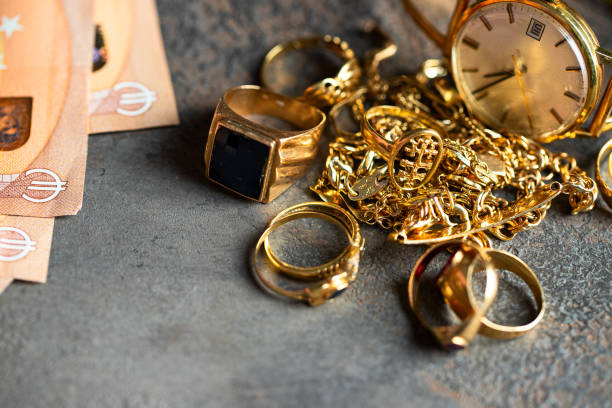Selling gold can feel like a big decision. Maybe you have old jewelry, coins, or other gold items sitting around, and you’re wondering if cash-for-gold services are a good idea. This guide will help you understand how these services work, how to choose the right buyer, and how to get the best deal. By the end, you’ll know if selling your gold is worth it for you. Let’s dive in!
Understanding the Gold Market
Before selling your gold, it’s smart to know a little about the gold market. This will help you get a fair price.
What is the Current Value of Gold?
The price of gold changes every day. It depends on things like demand, supply, and what’s happening in the world economy. On March 23, 2025, gold prices are strong because people see it as a safe investment. You can check the latest price online by looking up “gold spot price.” This tells you how much one ounce of pure gold is worth. Knowing this helps you figure out if a buyer is offering you a good deal.
How Does Gold Purity Affect Trade-in Value?
Not all gold is the same. Gold purity is measured in karats (K). Pure gold is 24K, but most jewelry is 10K, 14K, or 18K because pure gold is too soft. The higher the karat, the more it’s worth. For example, 18K gold has more pure gold than 10K, so it pays better. Buyers will test your gold to see how pure it is before making an offer. If your gold is less pure, you’ll get less money.
What Are the Different Types of Gold You Can Sell?
You can sell many types of gold, like:
- Jewelry: Rings, necklaces, or earrings (even if they’re broken).
- Coins: Old gold coins or collectibles.
- Bars: Small gold bars or bullion.
- Scrap Gold: Bits of gold from dental fillings or old electronics.
Each type has its own value based on weight and purity. Buyers accept almost any form of gold, so don’t throw anything away without checking!
Choosing a Gold Buyer
Picking the right buyer is key to getting a good price and avoiding scams. Here’s what to think about.
What to Look for in a Reputable Gold Buyer
A good buyer should:
- Be honest and clear about how they price your gold.
- Have a license or certification (if required in your area).
- Offer fair prices close to the current gold value.
- Explain the process step-by-step.
Look for buyers with a physical store or a trusted online presence. Avoid anyone who pressures you to sell fast.
The Importance of Customer Reviews and Ratings
Check what other people say about the buyer. Look at reviews on Google, Yelp, or their website. If most customers are happy and got fair deals, that’s a good sign. Bad reviews about low offers or rude service are red flags. A buyer with a strong reputation is more likely to treat you right.
Questions to Ask Before Selling Your Gold
Before you sell, ask these questions:
- How do you calculate the price?
- Are there any fees?
- How long will it take to get paid?
- Can I get my gold back if I change my mind?
Good buyers will answer clearly. If they dodge your questions, walk away.
Types of Gold Buyers
There are different places to sell your gold. Each has pros and cons.
Local Buyers: Pros and Cons
Pros:
- You can visit in person and get cash on the spot.
- No shipping worries.
Cons:
- Prices might be lower than online buyers.
- Fewer options if you live in a small town.
Local jewelry stores or gold shops are great if you want a quick, face-to-face deal.
Online Buyers: Pros and Cons
Pros:
- Often pay more because they have less overhead.
- You can compare offers from home.
Cons:
- You have to mail your gold, which feels risky.
- It takes longer to get paid.
Online buyers send you a kit to ship your gold. Choose one with insurance and tracking.
Pawn Shops: Advantages and Drawbacks
Pros:
- Fast cash, no questions asked.
- Good for small, quick sales.
Cons:
- They usually pay less than other buyers.
- Not experts in gold, so offers might not match value.
Pawn shops are easy but not the best for big payouts.
Getting the Best Price for Your Gold
You want as much money as possible, right? Here’s how to make it happen.
Factors That Affect the Amount of Cash You Will Receive
Your payout depends on:
- Gold Price: The current market rate.
- Purity: Higher karats mean more money.
- Weight: Heavier items fetch more.
- Buyer’s Cut: They take a percentage to make a profit.
Tips for Maximizing Your Payout
- Shop Around: Get quotes from at least three buyers.
- Time It Right: Sell when gold prices are high (check daily rates).
- Negotiate: If an offer feels low, ask for more.
- Avoid Middlemen: Sell directly to buyers, not through friends or random dealers.
A little effort can boost your cash by a lot!
How to Separate and Prepare Your Gold for Sale
Before selling:
- Sort your gold by type (jewelry, coins, etc.).
- Group items by karat if you know it (check for markings like “14K”).
- Clean it lightly with a cloth—don’t use harsh chemicals.
- Weigh it yourself so you know what to expect.
Prepared gold looks more valuable and speeds up the process.
Selling Your Gold Safely and Securely
Safety matters when dealing with valuable items. Here’s how to protect yourself.
How to Protect Yourself from Unfair Practices
- Get It in Writing: Ask for a receipt or offer letter before handing over your gold.
- Watch the Weighing: Make sure they weigh your gold in front of you.
- Avoid Scams: Don’t trust buyers who push you or offer way below market price.
If something feels off, trust your gut and leave.
What to Do If You’re Unsure About a Buyer
- Research more—check their reviews or ask friends.
- Start small—sell one item to test them.
- Call them with questions to see how they respond.
You can always wait and find a buyer you trust.
Reporting and Taxes
Selling gold might mean dealing with taxes. Here’s what you need to know.
Tax Reporting Obligations for Bullion Transactions
In many places, like the U.S., you might owe taxes if you make a profit. For example, if you bought gold for $500 and sold it for $800, the $300 gain could be taxable. Rules depend on your country, so check local laws.
How to Report Your Gold Sales
- Keep records of what you sold, the date, and the price.
- Report it on your tax return (in the U.S., it’s often on Form 1040, Schedule D).
- Ask a tax expert if you’re confused—it’s worth it to get it right.
Small sales might not need reporting, but big ones usually do.
Conclusion
So, are cash-for-gold services worth it? It depends on your needs. If you want quick cash and don’t mind getting a bit less than market value, they’re a great option. Local buyers, online services, and pawn shops all have their place—it’s about finding what works for you. To get the best deal, learn the gold market, pick a trusted buyer, and prepare your gold well. Selling safely and reporting any taxes keeps everything smooth.
If you’ve got gold lying around, now’s the time to turn it into cash. Just take it step-by-step, and you’ll come out ahead. Ready to sell? Go for it—you’ve got this!




